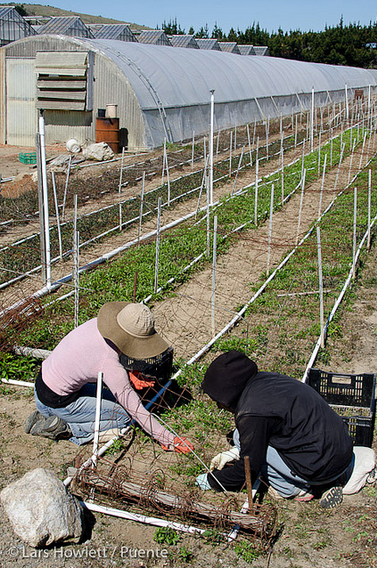
Day 6- National Farmworker Awareness Week
(Names have been changed to protect the privacy of individuals.)
Rosa came to the United States in 2002. In Mexico, she had been working for El Seguro Social (Mexico’s public health system), trained to travel from home to home and provide vaccinations.
Even with such a specialized job, “I was just making enough to meet the most basic needs,” she said. She finally told her mother she was going to go to California. Two of her brothers and one sister were there and although her mother tried to discourage her from the idea of leaving, she made the journey like millions of others who seek work in this country.
Rosa stills thinks about becoming a nurse or working with children, but without proper papers or status, those dreams have been put on hold. Today, she spends her days pulling weeds, picking flowers, and making bouquets with them. She has been working in a nursery in Pescadero since her arrival 11 years ago.
“I work only 5 hours every day. With the 8.25/hour I make, that’s only enough to pay for rent and basic expenses” says Rosa, who, for the first time, is considering finding another job. But despite financial challenges reminiscent of her past in Mexico, there is no doubt with Rosa that she enjoys what she does, working with the earth. Moreover, at her farm, she thinks men and women are treated equally.
When she’s not working, Rosa attends Puente’s Zumba dance fitness class. She considers herself shy and it took her some time to work up the confidence, but now she hardly ever misses one. “I come to socialize, to do something different. I still go to the last row, but I really enjoy coming.” She also takes English classes at Puente. “I would like to go to stores and understand what people say,” she shared, simply.
As Rosa continues to build her life here, the topic of immigration always looms. Reflecting on current events, she offers, “It is always plans, but at the end, nothing happens. I haven’t even heard it in the news so much lately, so I thought it was over again.” The hardest part for Rosa about her immigration status is not to being able to travel to Mexico. “I would like to see my sister” she said, referring to the one that stayed with her parents.
“It’s been more than ten years,” she said with a forced smile.




